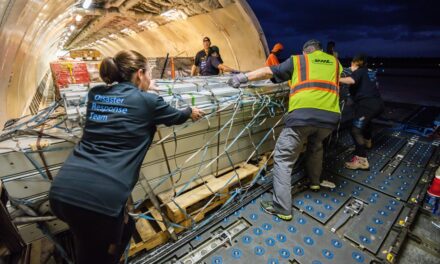
FedEx to build Asia’s largest cargo hub at Guangzhou’s Baiyun airport
China.
The company said it will invest 150 mln usd in the facility which will have a total floor space of 82,000 square meters located on 63 hectares.
The hub is expected to assume and expand the current activities of the existing hub in the Philippines, beginning in December 2008, the company said in a statement.
'More than two decades ago, we envisioned China as a nexus of global supply and demand and as a result became the first express carrier to enter the market,' said Frederick Smith, FedEx chairman.
'Today, we further invest in our leadership position by creating a new gateway that expands our customers' access to the global marketplace.'
FedEx said the decision to develop the new hub was made following a study that forecast Asia will remain the world's fastest growing regional air freight market, with growth of 8.5 pct each year until 2023.
China will be the main factor in that growth due to increasing traffic in semi-finished manufactured goods and steadily rising consumption, it said.
The study also showed that air freight from China to the US will grow at an average of 9.6 pct a year over the next 20 years, while traffic to Europe is predicted to grow at 9.3 pct over the same period.
FedEx said it will maintain its presence in the Philippines and is expanding its airport operations in Manila in order to provide back-office functions by centralising certain services.
shw/bmm/rc
FedEx press release 13.7.05
July 13, 2005 08:00 AM US Eastern Timezone
FedEx Expands Leadership In Asia Pacific with Plan to Build Region's Largest Air Cargo Hub in Guangzhou, China; Direct Economic Benefit to Chinese Economy Forecast to Reach $63 Billion by 2020
Note to Editors: FedEx Express press releases are available on the
World Wide Web at http://www.fedex.com
GUANGZHOU, China–(BUSINESS WIRE)–July 13, 2005–FedEx Express (FedEx), a subsidiary of FedEx Corp. (NYSE:FDX), announced today plans to build a new Asia Pacific hub at the Guangzhou Baiyun International Airport in Southern China to better serve its global customers doing business in and with the fast-growing China and Asia Pacific markets.
"More than two decades ago, we envisioned China as a nexus of global supply and demand and as a result became the first express carrier to enter the market," said Frederick W. Smith, chairman and chief executive officer, FedEx Corporation. "Today, with the announcement of our planned Guangzhou hub – the largest in Asia Pacific – we further invest in our leadership position by creating a new gateway that expands our customers' access to the global marketplace."
The Guangzhou facility – representing a $150 million dollar capital investment by FedEx – will have a total floor space of 82,000 square meters located on 63 hectares (155 acres). The hub will provide employment for 1,200 people at start-up and be capable of sorting up to 24,000 packages per hour. This hub is expected to assume and expand the current activities of the existing hub in the Philippines, beginning in December 2008.
FedEx based its plan to develop the new hub on several factors including an exhaustive series of feasibility studies which forecasted manufacturing and trading trends, both within Asia and internationally, for the next 30 years.
"We believe this hub will stimulate business both in Southern China and globally," said David L. Cunningham Jr., senior vice president of FedEx Express Asia Pacific. "Locally, a superior time-definite express service will attract high-value industries that require the speed, reliability and global access that FedEx provides."
A joint study by China's Development Research Commission and Campbell-Hill Aviation Group of the United States estimated that the direct output impact of a FedEx hub on China's economy is $11 billion in 2010, increasing to $63 billion by 2020 with the majority resulting from industrial expansion.
According to recent forecasts(1), transportation within Asia remains the world's fastest growing regional air freight market and is expected to grow each year at 8.5 percent until 2023. China will remain a key factor in that growth due in large part to increasing traffic in semi-finished manufactured goods and steadily rising consumption within China. Air freight from China to the U.S. is expected to grow at an average of 9.6 percent a year over the next 20 years, while traffic to Europe is predicted to grow almost as quickly at 9.3 percent over the same period.
The planned new hub will also allow FedEx to significantly improve service levels for locations in China.
FedEx will continue to maintain its presence in the Philippines, where Manila and Cebu will remain integral parts of the FedEx AsiaOne(R) network. The company is currently in the process of developing a regional center and expanding an operations gateway in Manila. We will be providing back-office functions as part of a regional strategy to provide continuous quality improvement by centralizing certain services.
About FedEx Corporation
FedEx Corp. (NYSE: FDX) provides customers and businesses worldwide with a broad portfolio of transportation, e-commerce and business services. With annual revenues of $29 billion, the company offers integrated business applications through operating companies competing collectively and managed collaboratively, under the respected FedEx brand. Consistently ranked among the world's most admired and trusted employers, FedEx inspires its more than 250,000 employees and contractors to remain "absolutely, positively" focused on safety, the highest ethical and professional standards and the needs of their customers and communities. For more information, visit fedex.com.
About FedEx Express
FedEx Express, a subsidiary of FedEx Corp., connects areas that generate 90% of the world's gross domestic product in one to three business days with door-to-door, customs-cleared service and a money-back guarantee. The company's unmatched air route authorities and infrastructure make it the world's largest express transportation company, providing fast, reliable and time-definite transportation of approximately 3.3 million packages to more than 220 countries and territories each working day. FedEx Express employs more than 139,000 employees and has over 50,000 drop-off locations, 670 aircraft and approximately 40,000 motorized vehicles in its integrated global network.
(1)BOEING World Air Cargo Forecast 2004-2005
FedEx Follows Asia Shifts
TRAFFIC WORLD, Sec. AIR, p WP 07-25-2005
By ED MCKENNA – ASSOCIATE EDITOR
Barely more than a year after the Philippines' role in global supply chains looked secure after FedEx Express extended its lease at Subic Bay, the China juggernaut hit. FedEx showed dramatic evidence of the impact China's rapid trading growth is having across the Pacific Rim when it announced this month it will base its new Asia express hub at China's Guangzhou Baiyun International Airport. The other side of the announcement is that FedEx will close its hub at Subic Bay, the former United States military base that helped launch FedEx delivery within Asia in 1995 and pointed the carrier and its competitors toward a new era of international competition. In May 2004, FedEx extended its lease to 2010 and at the same time took an option to lease land at nearby Clark Field, another former military base. FedEx's move to Southern China shows how Asia's economic balance has tilted in the past decade and how the scale of competition has changed. "China is the big market," said Tom Phillips, executive director of Seattle-based Keiser Phillips Associates. Baiyun is "a brand new airport, and with about 2.5 million-metric-ton cargo handling capability, it has a lot of room to expand." Slated to be completed by December 2008, the move will give FedEx greater direct access to the China market and much greater handling capacity. FedEx announced the move this month, following UPS's decision to base domestic China express service out of a hub in Shanghai and DHL's investment in Chinese operator Sinotrans, puts the world's three largest air express carriers within the rapidly growing market that has become central to world trade. FedEx said it will invest $150 million in building the hub on a 155-acre site at the airport, which opened in August 2004 in China's industrial southern region. "We believe this hub will stimulate business both in Southern China and globally," said David L. Cunningham Jr., senior vice president of FedEx Express Asia Pacific. The airport handled 632,302 metric tons of cargo last year up 16.2 percent over 2003, according the Airports Council International. The airport was ranked 31st among the world's largest cargo airports. Baiyun is also a hub for China Southern Airlines. The Philippines worked hard in the early 1990s to attract the carrier to the former U.S. base, even reworking its customs laws to facilitate the express operations. The airport handled 13,671 metric tons of cargo last year, up 4.3 percent over 2003, and about 694 all-cargo aircraft operations. The facility employs about 740 people. "The Guangzhou hub will be larger than (Subic Bay) e and will give us additional capacity e to meet the growing demands for air express in the region over the next three decades," said FedEx spokeswoman Darcie Goodwin. Unlike Subic Bay, it will be able to accommodate Airbus' large new A380s, which FedEx ordered for delivery starting in 2008. "Total floor space is nearly three times larger – 80,000 square meters compared to 27,800 square meters at Subic Bay," said Goodwin. The Guangzhou facility will be able to sort 24,000 packages per hour, about twice Subic Bay's capacity. FedEx will be able to "nearly double the number of flights" through its Asian hub from 65 to 114 weekly. The carrier will employ about 1,200 workers at the new hub. FedEx says its lease extension at Subic Bay allows it to leave any time with six months' notice. "FedEx is not now and will not be in breach of the Agreement when it relocates its Asia Hub to China," the company said in a statement. Goodwin said FedEx will continue to serve the Philippines through Manila and Cebu.













